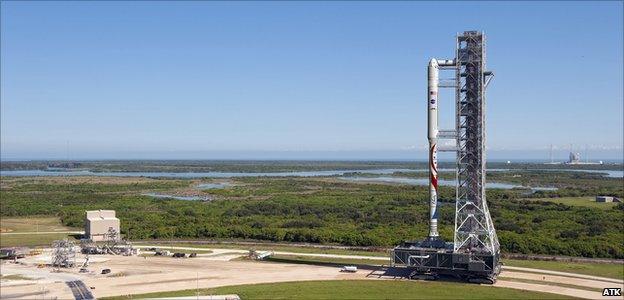Nasa budget boosts private space
- Published

A number of companies are competing to develop commercial launch services to sell to Nasa
US President Barack Obama wants more money to go towards developing commercial rockets and capsules to take American astronauts into orbit.
In his , Mr Obama is asking Congress for $850m to help seed the development of a series of private space vehicles.
The sum is a $238m increase on the 2011 budget which, although , has not actually yet been implemented.
The request for Nasa as a whole is $18.7bn - the figure it works to now.
And under this proposed budget, it is envisaged Nasa would stay working at $18.7bn right through to the Fiscal Year 2016.
Like all parts of government, the US space agency is having to operate under a stop-gap measure called a "continuing resolution".
This has frozen the federal budget at 2010 levels while lawmakers on Capitol Hill try to agree a fiscal future for the country.
There are many implications that follow from the latest budget request, but it is the detail on human spaceflight which is likely to catch the eye.
Charles Bolden says the International Space Station is Nasa's "jewel in the crown"
Nasa is about to retire its space shuttles, and will become reliant on Russian Soyuz capsules to get its astronauts to the International Space Station.
The agency is hoping this Russian dependence can be limited to just a few years by promoting a domestic private launch services industry.
It believes US firms' rocket and capsule designs can be matured with incentive payments distributed under its Commercial Crew Development (CCDev) programme.
This would then leave Nasa free to lead a project to produce a much bigger rocket and crew vehicle capable of travelling beyond the station to destinations such as asteroids and Mars.
The new budget request calls for $2.81bn to be spent in 2012 on this new heavy-lift Space Launch System (SLS) and its Multi-Purpose Crew Vehicle (MPCV).
But whereas the 2012 sum to help advance commercial rocket and capsule services is more than was authorised for 2011, the figure requested for the SLS and the MPCV enjoys no such hike. And, indeed, in future years the progress on the SLS and MPCV would be slowed under the new request. It envisages holding spending at $2.81bn for 2013 when Congress had expected to see expenditure of just over $4bn.
This, say commentators, is likely to lead to a repeat of last year's sharp disagreements between the White House and Capitol Hill on human spaceflight policy.
"The centrepiece for us is the International Space Station," explained Nasa Administrator Charles Bolden.
"If I want to sustain the ISS and have it safe for crews, I need to have a way to get cargo and crew there as quickly as we can - to decrease or at least hold the gap between the end of the shuttle era when we then have to rely on foreign entities to get there, and the beginning of a domestic commercial capability. With that goal in mind, we changed the balance of funding to commercial crew and the vehicles themselves."
The Commercial Spaceflight Federation (CSF), which includes in its membership the recipients of CCDev funds, welcomed the strong support for its cause in the proposed budget.
CSF President Bretton Alexander said: "In this constrained fiscal environment, commercial spaceflight is more important than ever. Nasa's Commercial Crew programme will result in significant savings to the US taxpayer, and will cut the amount of money the nation has been sending to Russia every year. Leveraging private investment is the only way Nasa can make its dollars go farther in these times of belt-tightening."
Nasa's proposed spending was part of a $3.73 trillion budget request the president sent to congress on Monday.
- Published14 February 2011
- Published8 February 2011
- Published8 December 2010
- Published11 October 2010